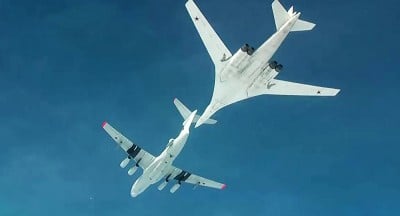
Acting by decree, an updated national security strategy, has been implemented which fundamentally redefines US-Russia relations.
It addresses significant threats Russia faces – notably US-led NATO encroaching on its borders, stating:
“The buildup of the military potential of the North Atlantic Treaty Organization (NATO) and vesting it with global functions implemented in violations of norms of international law, boosting military activity of the bloc’s countries, further expansion of the alliance, the approach of its military infrastructure to Russian borders create a threat to the national security.”
It accused Washington and it allies of “seeking to keep up their domination in global affairs,” risking greater conflicts than already.
Russia’s Foreign Ministry issued a statement, saying
“(t)he course NATO has assumed towards ‘deterring’ Russia, materialized as a buildup of military presence in countries of Eastern Europe and the Baltic States, increase in the number and intensity of exercises close to the Russian border, necessitated measures to counter the threats that NATO creates for Russia’s national security.”
“The remaining channels of a political dialogue with NATO and bilateral contacts with the leadership of the key member countries of the organization have been used for the explanation of negative consequences and potential risks from changes to the existing configuration of forces in Europe.”
The Ministry noted the “confrontational nature of the Alliance’s decision to invite Montenegro to the start of talks on its accession to NATO, leading to a further fragmentation of the European security space, creation of new demarcation lines on the continent.”
Are plans to incorporate Ukraine next not yet revealed? Will US-led NATO divisions be deployed along Russia’s borders more than already? Pentagon tactical and strategic nuclear weapons target its heartland.
Are things heading recklessly toward direct confrontation? Russia’s warning against deploying nuclear weapons in Europe to avoid “dangerous consequences” went unheeded.
Former German Defense Ministry Parliamentary State Secretary Willy Wimmer called “new attack options against Russia a conscious provocation of our Russian neighbor.”
Despite Bundestag members overwhelmingly ruling for the withdrawal of US nuclear weapons from Germany earlier, new ones are being deployed, sparking outrage in Russia.
Foreign Ministry spokeswoman Maria Zakharova called it “an infringement of Articles 1 and 2 of the Treaty on Non-Proliferation of Nuclear Weapons.”
Putin responded to Washington’s provocative Eastern European expansion, saying Russia “will be forced to aim our armed forces…at those territories from where the threat comes.”
“It is (US-led nuclear armed and dangerous) NATO that is moving towards our border, and we aren’t moving anywhere.”
Russia’s Foreign Ministry accused Washington of “inciting tensions and carefully nurturing (its) European allies’ anti-Russian phobias (as a pretext for) expanding its military presence and influence in Europe” – threatening world peace.
Key US NATO allies Britain, France, Germany, Turkey and others march in lockstep with its aggressive anti-Russian policy. Its officials have just cause for concern.
Russian lower house State Duma Speaker Sergey Naryshkin called NATO a “cancer tumor” in Europe. World peace depends on its “disband(ment).”
“This could be done in several stages,” he said. First “expel” America. Disbandment could “painlessly” follow – a vital step toward “strengthening security and stability on the European continent,” he stressed.
Russia’s updated national security strategy cited other significant threats – including internally or externally instigated color revolutions, a US specialty, threatening its sovereignty by undermining and destabilizing its political integrity.
US bioweapons threaten its security, the document saying its “network of…biological military labs is expanding on the territories of countries bordering Russia.”
Its “independent foreign and domestic policy has been met with counteraction by the US and its allies, seeking to maintain” unchallenged global dominance, including by marginalizing, containing, weakening and isolating Russia, a high-risk confrontational policy assuring no winners.
US-installed fascists in Ukraine pose a direct threat to Russia’s security. Their regime represents a “long-term source of instability in Europe and directly at the Russian border” – an intolerable situation forcing Putin to respond appropriately, at the same time fostering peace and stability.
Moscow wants nuclear proliferation constrained, urging “the creation of appropriate conditions that will enable a reduction of nuclear weapons without damaging international security and strategic stability” – perhaps a first step toward eliminating these hugely destructive weapons once and for all.
Its document explained “(a)n entire spectrum of political, financial, economic and information instruments has been brought into struggle for influence in the international arena.” America’s agenda threatens world peace.
Russia only intends using force when other options to “protect the national interests” fail, a possibility it hopes won’t be necessary.
It’s concerned about its resource-dependent economy, noting a need to become more diversified and competitive.
It cites “a lag in the development of advanced technologies, the vulnerability of the financial system, the imbalance of the budgetary system, the economy going offshore, the exhaustion of the raw materials base, the strength of the shadow economy, conditions leading to corruption and criminal activities, and uneven development of regions.”
It intends initiatives designed to deal with these and other significant issues – planning social and economic policies to strengthen its financial system, as well as “ensur(e) its sovereignty and the stability of the national currency.”
It understands the threats and challenges it faces – intending to address them effectively, permitting no outside forces from compromising its sovereignty, especially US-led Western ones.
Whether its efforts will be enough to avoid potentially catastrophic global war is the most pressing issue of our time.
Stephen Lendman lives in Chicago. He can be reached at [email protected].
His new book as editor and contributor is titled “Flashpoint in Ukraine: US Drive for Hegemony Risks WW III.”
http://www.claritypress.com/LendmanIII.html
Visit his blog site at sjlendman.blogspot.com.
Listen to cutting-edge discussions with distinguished guests on the Progressive Radio News Hour on the Progressive Radio Network. It airs three times weekly: live on Sundays at 1PM Central time plus two prerecorded archived programs.
Source Article from http://www.globalresearch.ca/russias-new-national-security-strategy/5498735
Related posts:
Views: 0
 RSS Feed
RSS Feed

















 January 1st, 2016
January 1st, 2016  Awake Goy
Awake Goy 
 Posted in
Posted in  Tags:
Tags: 
















